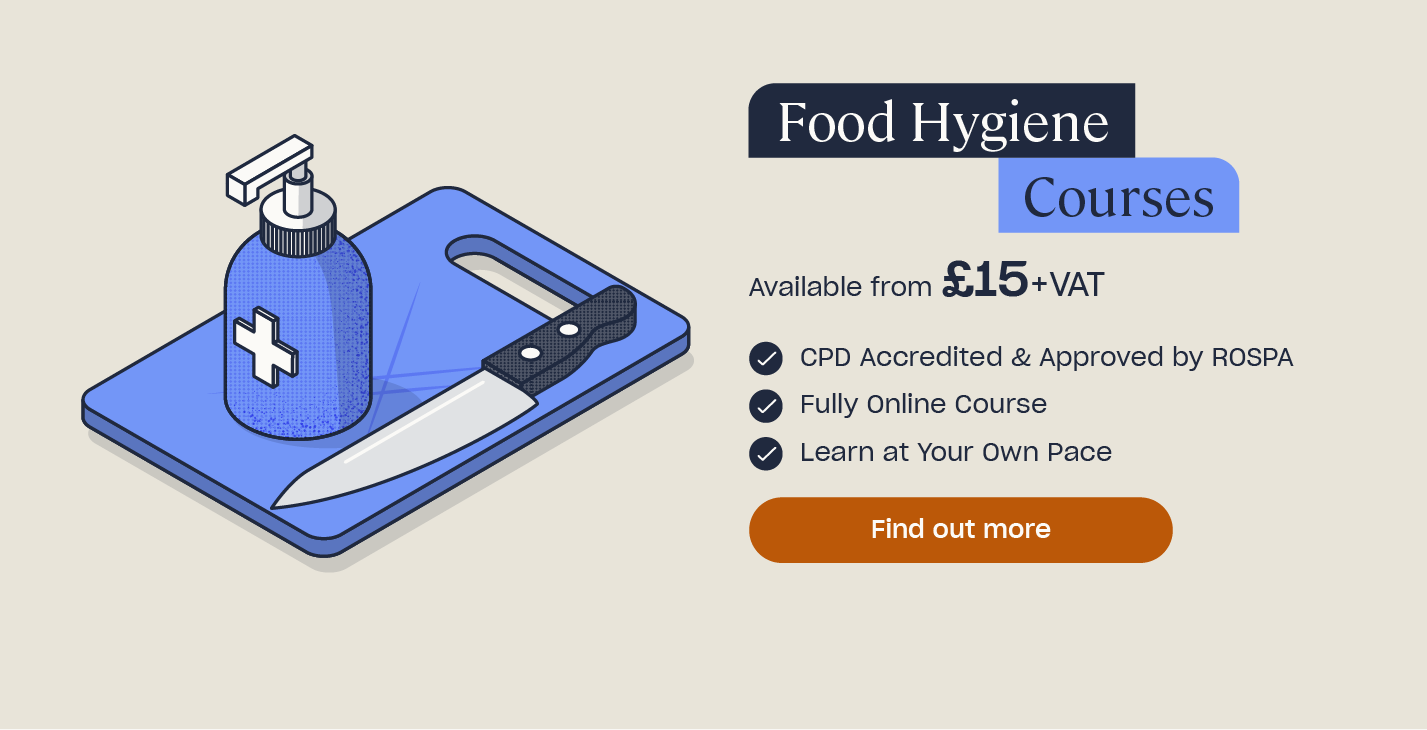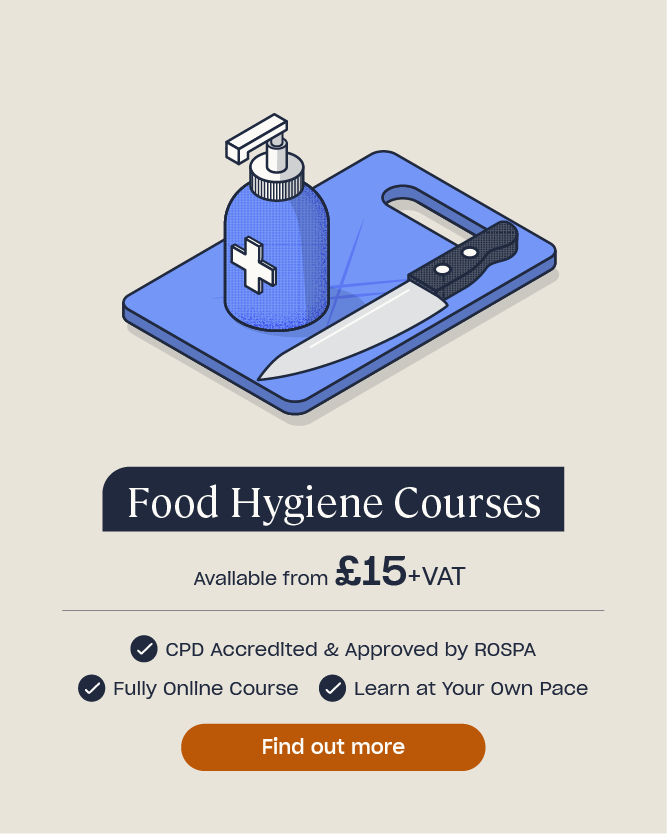Turkey Food Safety: Tips for Christmas Food Safety
Over the Christmas holidays, cooking a turkey is at the top of many people’s to-do lists. For a successful festive period – and whether you’re new to preparing Christmas dinner or have been cooking roast turkey for decades – it’s essential to know how to handle, cook and store your raw turkey safely so that the chances of food poisoning are minimised. In this article, we’ll look at when to buy your Christmas turkey, how to store it safely before the big day, how to ensure your turkey is cooked thoroughly and what to do with the inevitable turkey leftovers.
When to Buy Your Christmas Turkey
Whether you’re buying a fresh raw turkey or a frozen one, choosing the right moment to buy your Christmas turkey is key for a successful festive lunch. Frozen turkeys can be bought well in advance of the big day as they can be stored for much longer than fresh ones, so are a good choice if you like to plan ahead. If you’re planning to buy a fresh Christmas turkey, then you’ll want to wait until as last minute as possible for optimum freshness.
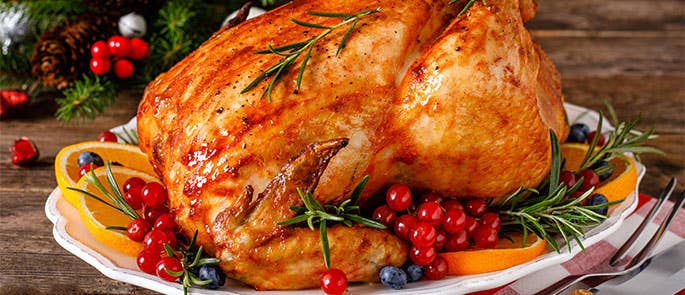
How Long Does Turkey Last in the Fridge?
If you’re intending to keep your raw turkey in the fridge before Christmas dinner, then ensure you take a close look at the use by date on the turkey’s wrapper. Both whole turkeys and turkey crowns will last in the fridge up to and including the use by date indicated on their packaging. Depending on where you buy your fresh turkey from, the use by date is likely to be anywhere from 2 to 7 days after the date of purchase.
To ensure your turkey lasts in the fridge and to prevent food poisoning bacteria from developing:
- Store the fresh turkey in the fridge as soon as possible after purchase.
- Keep the raw turkey in its original packaging and place it in a large tray or oven dish to catch any drips.
- Put the turkey (in its tray) on the bottom shelf of your fridge and away from any cooked, ready-to-eat foods to avoid cross-contamination.
- Check that your fridge temperature is set to a temperature below 5 °C to avoid the growth of harmful food poisoning bacteria.
- If your turkey has been previously frozen and then thawed, it will last in the fridge for 1-2 days before it will need cooking.
How Long Does Turkey Last in the Freezer?
If you’re buying a frozen raw turkey ahead of the Christmas period, then it should be stored in the freezer until you are ready to thaw and cook it. Whole turkeys and turkey crowns can be stored in the freezer for up to 3 months. After this time, the texture or quality of the meat may not remain at its best.
To ensure your turkey lasts in the freezer, check that the temperature is set to -18 °C or below.
How to Prepare a Turkey for Christmas
When the time comes to prepare your turkey for Christmas dinner, you’ll first need to ensure it’s fully defrosted if you’ve stored it in the freezer or simply take it out the fridge if you have a fresh bird. Then you can start to add your chosen flavours, seasonings, fats or oils ready for roasting.
Before you can prepare a frozen turkey, it must be fully defrosted. If the turkey is still partially frozen when you try to cook it, then it won’t cook all the way through and harmful food poisoning bacteria may remain. See our tips on how to defrost a turkey safely in the next section below.
It’s also important that you prepare your turkey in a way which avoids cross-contamination (the transfer of harmful bacteria from one surface to another). This means preparing your raw turkey away from other foods, especially ready-cooked ones, and remaining clean and hygienic throughout.
Top tips for preparing a Christmas turkey to prevent cross-contamination are as follows:
- Never wash a raw turkey before cooking it, as the splashes can spread harmful bacteria such as Salmonella or E. coli.
- After handling a raw turkey, wash your hands thoroughly before handling anything else.
- Always clean worktops, chopping boards and utensils thoroughly after they’ve come into contact with raw turkey meat.
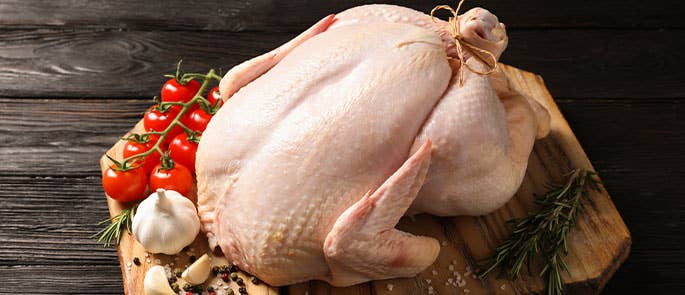
How to Defrost a Turkey
If you’ve bought a frozen turkey or have put a fresh turkey in the freezer ahead of Christmas day, then you’ll need to defrost it fully before you can cook it. If your turkey is not fully defrosted when you put it in the oven, it’s likely to cook unevenly and may cause food poisoning.
Check the turkey’s packaging for guidance on how long the defrosting process will take, as large birds can take several days to thaw out fully. A whole frozen turkey can take up to 5 days to defrost all the way to the middle. A turkey crown is a much smaller joint of meat and is likely to be defrosted within 24 hours.
As a general guide, allow 10-12 hours of defrosting time per kg of turkey.
You should always defrost a turkey in the fridge and not at room temperature. Whilst this may make the thawing process slower, it helps to keep the meat cold and prevents it from entering the temperature danger zone – between 8 ºC and 63 ºC – where harmful bacteria can rapidly develop.
To defrost your turkey safely, keep it in its original packaging and put it in a tray or oven dish, before placing it on the bottom shelf of the fridge to thaw out. You can check whether the turkey is fully defrosted by making sure there are no ice crystals inside the cavity. Once defrosted, cook the turkey within 24 hours.
How to Cook a Turkey for Christmas
Cooking the turkey for Christmas dinner is often seen as one of the most important parts of the day, so it’s important that you get it right for both maximum flavour and maximum safety.
Check the instructions on the turkey’s packaging for guidance on how long to cook the turkey for but, as a general guide, allow 45 minutes per kg for a small turkey and 35 minutes per kg for a large turkey at an oven set to 180 °C.
Follow our top tips on how to cook a turkey for Christmas for a successful and safe festive feast:
- Cover your turkey with foil whilst it’s roasting to keep the moisture in then uncover it for the last half an hour to brown and crisp up the skin.
- To prevent the meat from drying out during cooking, baste it every hour with the juices that collect in the oven tray.
- Bear in mind that a stuffed turkey will take longer to cook, so ideally cook the stuffing separately to ensure the meat cooks thoroughly all the way through.
- Remember to wash your hands every time you touch the turkey, especially whilst it’s still raw.
- Use a temperature probe thermometer to check the turkey is hot and cooked all the way through before serving. The probe should be put into the thickest part of the meat, between the leg and the breast, and should read at least 75 °C.
- If you don’t have a temperature probe, then cut into the thigh meat to check there’s no pink meat remaining and the juices run clear.
How to Store Turkey Leftovers and How Long Do Turkey Leftovers Last?
It’s inevitable that you’ll have turkey leftovers after your Christmas dinner, as well as leftover vegetables, sides and desserts. To store your leftovers to enjoy later, it’s best to get them in the fridge or freezer as soon as possible.
Ideally, turkey leftovers should be refrigerated within 2 hours of being cooked to prevent them from remaining at room temperature for too long. After 2 hours at room temperature, food poisoning bacteria may begin to develop on the food.
Put any turkey leftovers in a sealed container or cover with foil, pop them in the fridge and then eat them within the next 2-3 days. After this time, leftovers should be discarded as they may not be safe to consume.
Almost all leftover Christmas food can be frozen, provided it’s cooled down and stored in a sealed, labelled container as soon as possible. Freezing will ensure your turkey leftovers last for much longer, as they can remain frozen for up to 6 months. Our guides on How to Store Food in the Freezer and How Long Food Can Be Frozen For provide further tips if you want to learn more.
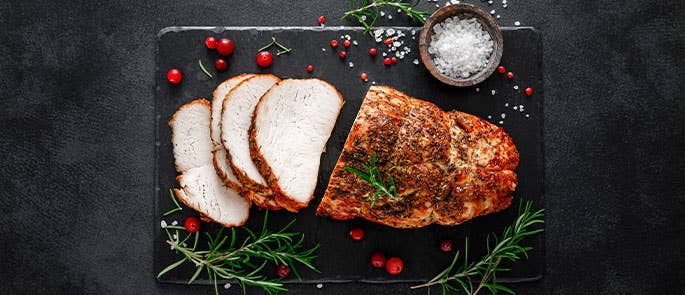
How to Reheat Turkey
If you’re planning to reheat turkey or other Christmas leftovers, it’s vital that you do so safely and properly.
Reheated food must be steaming hot all the way through in order to kill any harmful bacteria that may have developed. This means reheating it to a core temperature of at least 75 °C for 30 seconds. It’s best to use a probe thermometer to check this, as all foods will take different times to reheat to the right temperature.
For optimum food safety, you should avoid reheating leftover turkey and other foods more than once. Our article on How Many Times Can You Reheat Food Safely? provides more guidance on reheating leftovers safely.
Turkey food safety is an essential yet often overlooked part of the Christmas holidays. We all want our Christmas dinner to be a success, and storing and cooking your turkey correctly is vital for ensuring food poisoning is avoided during the festive season.
Further Resources:
- Food Hygiene Courses
- Can I Freeze This & For How Long?
- Planning a Christmas Dinner: Free Checklist
- Can I Cook This From Frozen?


